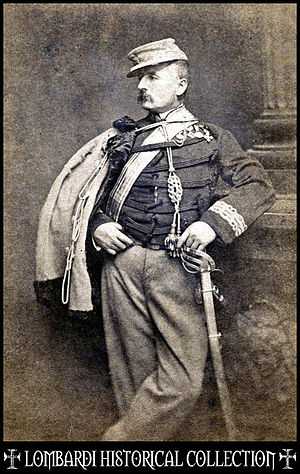Nino Bixio

Nino Bixio (Italian pronunciation: [ˈnino ˈbiksjo] or, in Ligurian, [ˈbiʒo]; October 2, 1821 – December 16, 1873) was an Italian soldier and politician, who fought for the Italian unification.
Life and career
He was born Gerolamo Bixio in Genoa. While still a boy, Bixio was compelled by his parents to embrace a career in the navy of the Kingdom of Sardinia. After numerous adventures in various places of the world, he returned to Italy in 1846, joining the Giovine Italia. On 4 November 1847, he made himself conspicuous at Genoa by seizing the bridle of Charles Albert's horse and crying, "Pass the Ticino, Sire, and we are all with you." [1]
He fought through the campaign of 1848, became captain under Giuseppe Garibaldi at Rome in 1849, taking prisoners an entire French battalion, and gaining the gold medal for military valour. In 1859 he commanded a Hunters of the Alps battalion, fought in the Battle of Varese, and gained the Military Cross of Savoy. [1]
One of the organizers of Garibaldi's expedition of the Thousand (1860) against the Kingdom of the Two Sicilies, he turned the day in favor of the Thousand at the Battle of Calatafimi.[1]
Meanwhile, the Sicilian peasants had hoped - and did not get from Garibaldi - an immediate relief from the grievous conditions to which they were forced by the landowners. They revolted in several localities. At Bronte, on August 4, 1860, the recovered Bixio bloodily repressed one of these revolts with two battalions of Redshirts.[1]
By August 21 of the year Bixio and the Garibaldines entered in Reggio Calabria, in the Neapolitan mainland. He took part in the Battle of the Volturno, where his leg was broken.[1]
Elected deputy in 1861, he endeavoured to reconcile Cavour and Garibaldi. In 1866, at the head of the seventh division, he covered the Italian retreat from the Battle of Custoza, ignoring the Austrian summons to surrender. Appointed senator in February 1870, he was in the following September given command of a division during the movement against Rome, took Civitavecchia, and on 20 September 1870, he participated in the capture of Rome, which completed the unification of Italy.[1]
On 16 December 1873, he died of cholera at Aceh Bay in Sumatra en route for Batavia (modern day Jakarta), where he was slated to take command of a commercial expedition.[1]
Notes
| Wikimedia Commons has media related to Nino Bixio. |
References
 This article incorporates text from a publication now in the public domain: Chisholm, Hugh, ed. (1911). "Bixio, Nino". Encyclopædia Britannica 4 (11th ed.). Cambridge University Press.
This article incorporates text from a publication now in the public domain: Chisholm, Hugh, ed. (1911). "Bixio, Nino". Encyclopædia Britannica 4 (11th ed.). Cambridge University Press.- Staglieno, Marcello (1973). Nino Bixio. Milan: Rizzoli.
|